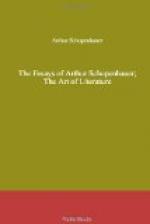When we gain access to the histories of China and of India, the endlessness of the subject-matter will reveal to us the defects in the study, and force our historians to see that the object of science is to recognize the many in the one, to perceive the rules in any given example, and to apply to the life of nations a knowledge of mankind; not to go on counting up facts ad infinitum.
There are two kinds of history; the history of politics and the history of literature and art. The one is the history of the will; the other, that of the intellect. The first is a tale of woe, even of terror: it is a record of agony, struggle, fraud, and horrible murder en masse. The second is everywhere pleasing and serene, like the intellect when left to itself, even though its path be one of error. Its chief branch is the history of philosophy. This is, in fact, its fundamental bass, and the notes of it are heard even in the other kind of history. These deep tones guide the formation of opinion, and opinion rules the world. Hence philosophy, rightly understood, is a material force of the most powerful kind, though very slow in its working. The philosophy of a period is thus the fundamental bass of its history.
The NEWSPAPER, is the second-hand in the clock of history; and it is not only made of baser metal than those which point to the minute and the hour, but it seldom goes right.
The so-called leading article is the chorus to the drama of passing events.
Exaggeration of every kind is as essential to journalism as it is to the dramatic art; for the object of journalism is to make events go as far as possible. Thus it is that all journalists are, in the very nature of their calling, alarmists; and this is their way of giving interest to what they write. Herein they are like little dogs; if anything stirs, they immediately set up a shrill bark.
Therefore, let us carefully regulate the attention to be paid to this trumpet of danger, so that it may not disturb our digestion. Let us recognize that a newspaper is at best but a magnifying-glass, and very often merely a shadow on the wall.
The pen is to thought what the stick is to walking; but you walk most easily when you have no stick, and you think with the greatest perfection when you have no pen in your hand. It is only when a man begins to be old that he likes to use a stick and is glad to take up his pen.
When an hypothesis has once come to birth in the mind, or gained a footing there, it leads a life so far comparable with the life of an organism, as that it assimilates matter from the outer world only when it is like in kind with it and beneficial; and when, contrarily, such matter is not like in kind but hurtful, the hypothesis, equally with the organism, throws it off, or, if forced to take it, gets rid of it again entire.
To gain immortality an author must possess so many excellences that while it will not be easy to find anyone to understand and appreciate them all, there will be men in every age who are able to recognize and value some of them. In this way the credit of his book will be maintained throughout the long course of centuries, in spite of the fact that human interests are always changing.




